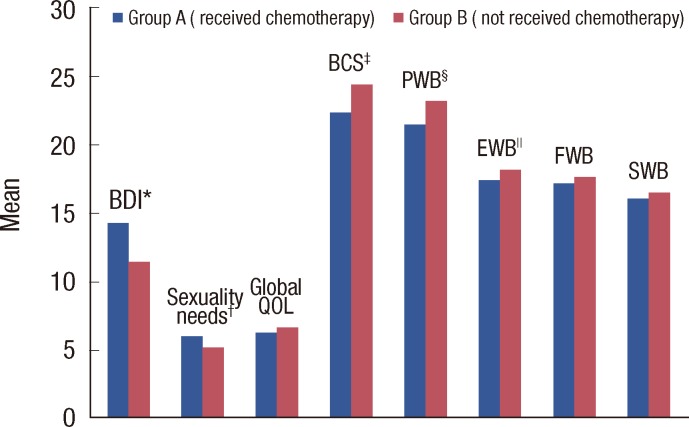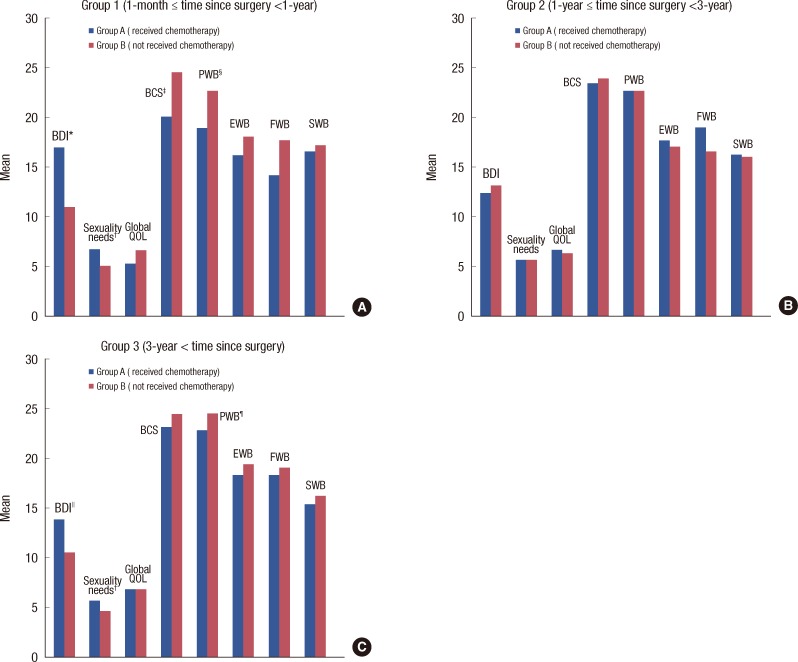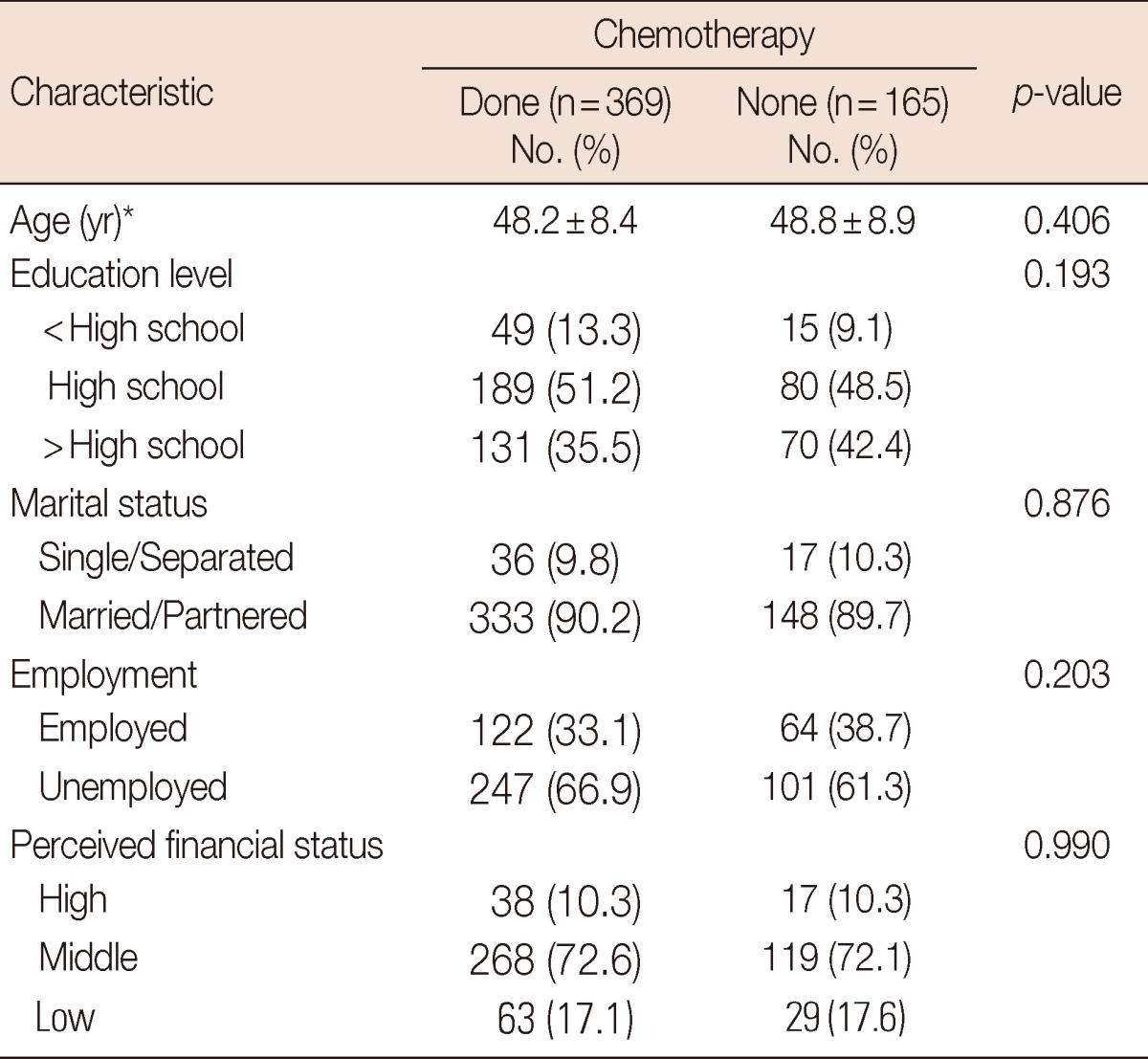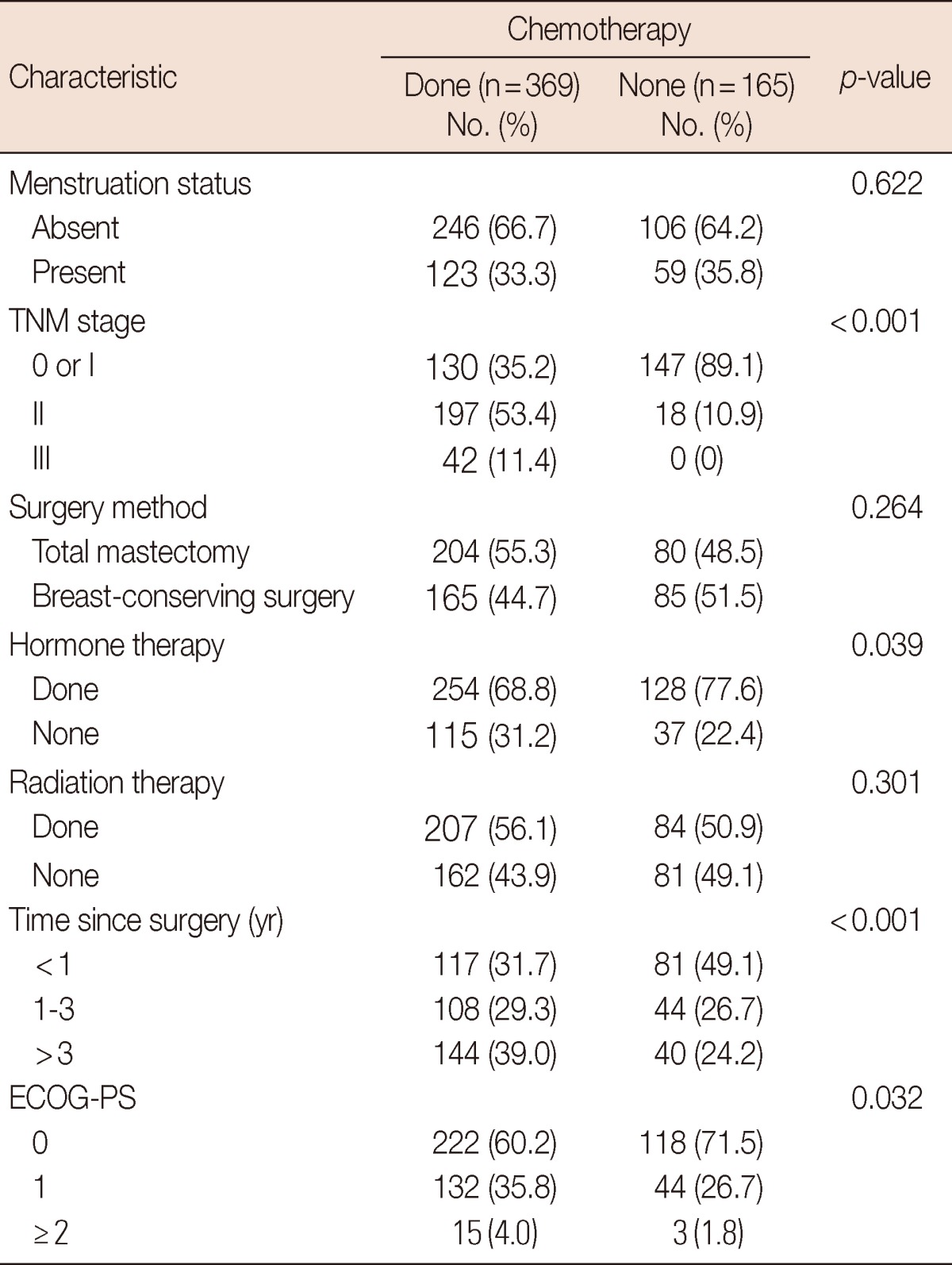1. Azim HA Jr, de Azambuja E, Colozza M, Bines J, Piccart MJ. Long-term toxic effects of adjuvant chemotherapy in breast cancer. Ann Oncol. 2011; 22:1939–1947. PMID:
21289366.

2. Ganz PA, Desmond KA, Leedham B, Rowland JH, Meyerowitz BE, Belin TR. Quality of life in long-term, disease-free survivors of breast cancer: a follow-up study. J Natl Cancer Inst. 2002; 94:39–49. PMID:
11773281.

3. Engel J, Kerr J, Schlesinger-Raab A, Sauer H, Hölzel D. Quality of life following breast-conserving therapy or mastectomy: results of a 5-year prospective study. Breast J. 2004; 10:223–231. PMID:
15125749.

4. Ganz PA, Schag AC, Lee JJ, Polinsky ML, Tan SJ. Breast conservation versus mastectomy. Is there a difference in psychological adjustment or quality of life in the year after surgery? Cancer. 1992; 69:1729–1738. PMID:
1551058.
5. Rowland JH, Desmond KA, Meyerowitz BE, Belin TR, Wyatt GE, Ganz PA. Role of breast reconstructive surgery in physical and emotional outcomes among breast cancer survivors. J Natl Cancer Inst. 2000; 92:1422–1429. PMID:
10974078.

6. Nissen MJ, Swenson KK, Ritz LJ, Farrell JB, Sladek ML, Lally RM. Quality of life after breast carcinoma surgery: a comparison of three surgical procedures. Cancer. 2001; 91:1238–1246. PMID:
11283922.
7. Maunsell E, Brisson J, Deschenes L. Psychological distress after initial treatment for breast cancer: a comparison of partial and total mastectomy. J Clin Epidemiol. 1989; 42:765–771. PMID:
2760668.

8. Shimozuma K, Ganz PA, Petersen L, Hirji K. Quality of life in the first year after breast cancer surgery: rehabilitation needs and patterns of recovery. Breast Cancer Res Treat. 1999; 56:45–57. PMID:
10517342.

9. Knobf MT. Physical and psychologic distress associated with adjuvant chemotherapy in women with breast cancer. J Clin Oncol. 1986; 4:678–684. PMID:
3754573.

10. Ganz PA, Rowland JH, Meyerowitz BE, Desmond KA. Impact of different adjuvant therapy strategies on quality of life in breast cancer survivors. Recent Results Cancer Res. 1998; 152:396–411. PMID:
9928575.

11. Joly F, Espié M, Marty M, Héron JF, Henry-Amar M. Long-term quality of life in premenopausal women with node-negative localized breast cancer treated with or without adjuvant chemotherapy. Br J Cancer. 2000; 83:577–582. PMID:
10944595.

12. Ganz PA, Schag CA, Cheng HL. Assessing the quality of life: a study in newly-diagnosed breast cancer patients. J Clin Epidemiol. 1990; 43:75–86. PMID:
2319284.
13. Ganz PA, Hirji K, Sim MS, Schag CA, Fred C, Polinsky ML. Predicting psychosocial risk in patients with breast cancer. Med Care. 1993; 31:419–431. PMID:
8501990.

14. Park BW, Hwang SY. Depression and coping in breast cancer patients. J Breast Cancer. 2009; 12:199–209.

15. Little RJ, Rubin DB. Statistical Analysis with Missing Data. 2nd ed. Hoboken: John Wiley & Sons;2002. p. 105.
16. Sørensen JB, Klee M, Palshof T, Hansen HH. Performance status assessment in cancer patients. An inter-observer variability study. Br J Cancer. 1993; 67:773–775. PMID:
8471434.

17. Brady MJ, Cella DF, Mo F, Bonomi AE, Tulsky DS, Lloyd SR, et al. Reliability and validity of the Functional Assessment of Cancer Therapy-Breast quality-of-life instrument. J Clin Oncol. 1997; 15:974–986. PMID:
9060536.

18. Yoo H, Suh C, Kim S, Eremenco S, Kim H, Kim S. Korean translation and validation of the functional assessment of cancer therapy-lung (FACT-L) version 4. Qual Life Res. 2006; 15:161–166. PMID:
16411040.

19. Schag CA, Heinrich RL, Aadland RL, Ganz PA. Assessing problems of cancer patients: psychometric properties of the cancer inventory of problem situations. Health Psychol. 1990; 9:83–102. PMID:
2323331.

20. Bonevski B, Sanson-Fisher R, Girgis A, Burton L, Cook P, Boyes A. Supportive Care Review Group. Evaluation of an instrument to assess the needs of patients with cancer. Cancer. 2000; 88:217–225. PMID:
10618626.

21. Hwang SY, Park BW. The perceived care needs of breast cancer patients in Korea. Yonsei Med J. 2006; 47:524–533. PMID:
16941743.

22. Hahn HM, Yum TH, Shin YW, Kim KH, Yoon DJ, Chung KJ. A standardization study of Beck Depression Inventory in Korea. J Korean Neuropsychiatr Assoc. 1986; 25:487–500.
23. Lee Y, Song J. A study of the reliability and the validity of the BDI, SDS, and MMPI-D scales. Korean J Clin Psychol. 1991; 10:98–113.
24. Ganz PA, Kwan L, Stanton AL, Krupnick JL, Rowland JH, Meyerowitz BE, et al. Quality of life at the end of primary treatment of breast cancer: first results from the moving beyond cancer randomized trial. J Natl Cancer Inst. 2004; 96:376–387. PMID:
14996859.

25. Lam WW, Au AH, Wong JH, Lehmann C, Koch U, Fielding R, et al. Unmet supportive care needs: a cross-cultural comparison between Hong Kong Chinese and German Caucasian women with breast cancer. Breast Cancer Res Treat. 2011; 130:531–541. PMID:
21617919.

26. Ministry of Health, Welfare & Family Affairs. Annual Report of Cancer Incidence (2007), Cancer Prevalence (2007) and Survival (1993-2007) in Korea. Seoul: Ministry of Health, Welfare & Family Affairs;2009.
27. Rowland JH, Massie MJ. Breast cancer. In : Holland JC, Breitbart WS, Jacobsen PB, Lederberg MS, Loscalzo MJ, McCorkle R, editors. Psycho-Oncology. 2nd ed. New York: Oxford University Press;2010. p. 177–186.
28. Bower JE, Ganz PA, Desmond KA, Bernaards C, Rowland JH, Meyerowitz BE, et al. Fatigue in long-term breast carcinoma survivors: a longitudinal investigation. Cancer. 2006; 106:751–758. PMID:
16400678.
29. Schwartz AL. Physical activity after a cancer diagnosis: psychosocial outcomes. Cancer Invest. 2004; 22:82–92. PMID:
15069765.

30. McTiernan A. Physical activity after cancer: physiologic outcomes. Cancer Invest. 2004; 22:68–81. PMID:
15069764.







 PDF
PDF ePub
ePub Citation
Citation Print
Print




 XML Download
XML Download